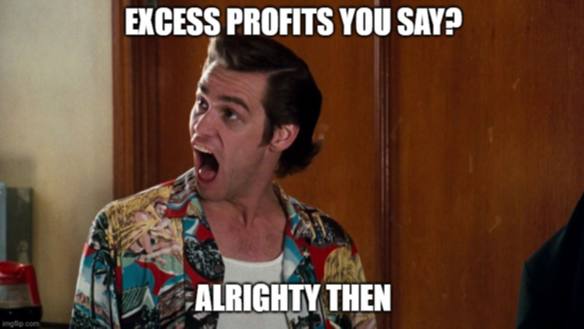
Edward Price is a former British economic official and current teacher of political economy at New York University’s Center for Global Affairs.
Aristotle wasn’t much of a party animal. The philosopher’s catchphrase could have been nothing in excess. Instead, everything was about the golden mean, or the average of two extremes: excess and deficit. This thinking is always fashionable in musty academies. Like, for example, the European Commission.
Faced with impending energy price doom, the FT reports that the Commission wants energy companies to hand over “excess profits” to the EU’s member states. The proposal — a windfall tax — aims to raise €140bn. But just so we’re on the same page, what does “excess profits” mean?
At first glance, it means what the European Commission says it means. The FT again:
“The commission proposal would set a mandatory threshold for prices charged by companies that produce low-cost, non-gas energy, such as nuclear and renewables groups. Companies would have to give EU states the “excess profits” generated beyond this level, which the commission seeks to set at €180/MWh.”
Erm, OK. If you’re making more than €180 per megawatt hour, you’re making excess profits. But does that mean the profits made on €179 per megawatt hour are “acceptable profits”? And at what level would “deficient” profits kick in? Besides, after costs, aren’t all profits already definitionally “excess”? Isn’t the whole point of capitalism to move money from where it is to where it isn’t? Doesn’t this mean local excesses balance the whole?
Cast those thoughts aside. What about a second glance? As well as working to reduce demand, and introducing a temporary revenue cap on ‘inframarginal’ electricity producers (basically renewables, nuclear and lignite), the Commission:
“ . . . is also proposing a temporary solidarity contribution on excess profits generated from activities in the oil, gas, coal and refinery sectors . . . [which will be] be collected by Member States on 2022 profits which are above a 20% increase on the average profits of the previous three years.”
Bingo. So, excess means twenty points above the last twelve quarters’ average. Introduce this windfall tax and households and firms will, ceteris paribus, pay a fair amount to heat things up. No more excesses!
But if we’re doing this, let’s do this. Are Germany’s export earnings excessive? Is French agriculture excessive? Does the UK sell too much tat to unwitting victim-tourists at airports?
Who’s to say?
This is a serious point. We need markets and policymakers to be absolutely clear about the concepts they use. If not, disaster follows. Just think of the following abstractions and what they really mean: subprime mortgages (broke debtors); a flexible average inflation target (improv night at the Fed); quantitative easing (money printer go brr); outright monetary transactions (Draghi smash). And so on. The list goes on.
So, here it is: the Commission is not taxing “excess profits”. It’s taxing “profits”. Donc très simple. And that’s OK. Who’s going to argue with a fiscal intervention at times like these?
Let’s just remember to watch out for any and all conceptual over-reach. There can be no central brain, not even Aristotle’s, better than the complex and strange flow of events. The golden mean is, all told, incalculable.

